In Missouri, the “No Pay/No Play” statute, RSMo. § 303.390, provides that a driver with no automobile insurance waives their ability to claim non-economic damages (i.e. pain and suffering) against another driver unless it can be proven that the insured driver was under the influence at the time of the accident (1). The uninsured motorist can still obtain other damages like property damage, medical bills, and lost wages.
The statute reads, in relevant part:
An uninsured motorist shall waive the ability to have a cause of action or otherwise collect for noneconomic loss against a person who is in compliance with the financial responsibility laws of this chapter due to a motor vehicle accident in which the insured driver is alleged to be at fault. For purposes of this section, the term “uninsured motorist” shall include:
-
- An uninsured driver who is the owner of the vehicle;
- An uninsured permissive driver of the vehicle; and
- Any uninsured nonpermissive driver.
Such waiver shall not apply if it can be proven that the accident was caused, in whole or in part, by a tort-feasor who operated a motor vehicle under the influence of drugs or alcohol, or who is convicted of involuntary manslaughter under [the criminal statute], or assault in the second degree under [the criminal statute].
Some Missouri trial courts have ruled this statute “unconstitutional.” As a result, Plaintiff’s attorneys are claiming that it is an unconstitutional statute at the time insurance companies deny coverage. However, neither the Missouri Supreme Court nor any Missouri appellate court have issued a ruling on the statute.
Missouri trial court judges holding the statute unconstitutional are basing their rulings on a case from the Missouri Supreme Court titled Watts v. Lester E. Cox Medical Centers (2), in which the Court held that the cap on non-economic damages in a medical malpractice action is unconstitutional because it infringes on a person’s right to trial by jury.
In Watts; however, the Missouri Supreme Court specifically noted that the cap at issue on economic damages in medical malpractice actions operated “wholly independent of the facts of the case,” i.e. the damages cap would apply no matter the circumstances of the case and regardless of any conduct by the parties. In the case of “No Pay/No Play,” however, the cap on non-economic damages acts a waiver only for those motorists not carrying mandatory insurance.
Plaintiff’s attorneys argue the Watts case applies to the No Pay/No Play statute insofar as they are both related to caps on non-economic damages. However, the No Pay/No Play statute has never been decided as “unconstitutional” by a court of appeal in Missouri. Whilst Plaintiff’s attorneys will cite trial court decisions holding the statute unconstitutional, there are likewise trial court rulings holding that the statute is constitutional (3).
The enforcement of the statute will depend entirely upon the reading given by the trial judge to which the case is assigned. Insurers should be able to rely on this statute; however, when performing a claims analysis, and should consider the landscape.
Article by GOT attorney, Holly Rogers
(1) Illinois does not have a “No Pay/No Play” statute.
(2) 376 S.W. 3d 633 (Mo. 2012).
(3) See Miller v. McClellan (St. Louis County Case No. 17SL-CC02989 – opinion issued by Judge Ott); Mays v. Williams (Jackson County Case No. 1516-CV14915 – opinion issued by Judge Harrell); Crider v. Lowe’s Home Centers, Inc., et al. (Franklin County Case No. 13AB-CC000241 – opinion issued by Judge Wood); Kelly v. Parr (Benton County Case No. 16BE-CC00042 – opinion issued by Judge Pilley).



